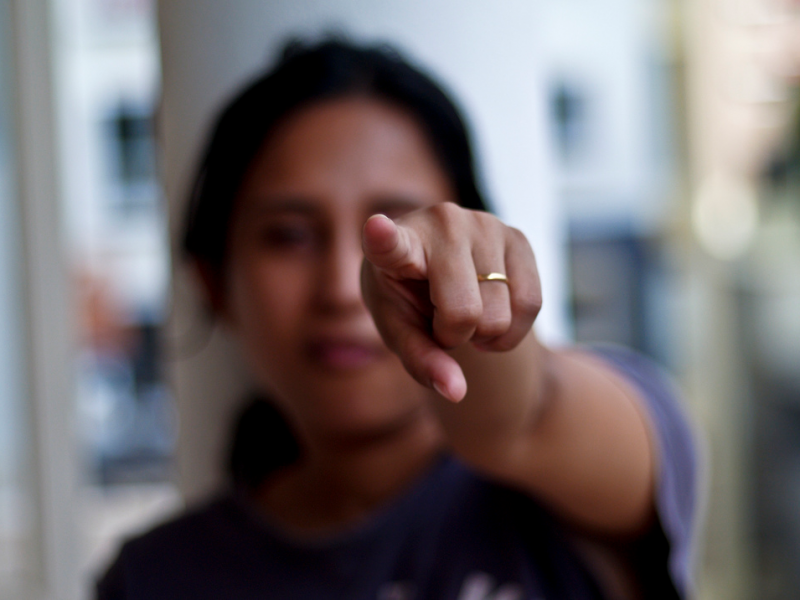- The signs that someone is lying aren’t always easy to decipher.
- And, unfortunately, there’s no way to determine whether or not someone’s being honest with 100% certainty.
- But there are some obvious signs that someone might be lying. Keep reading for a list of signs you can watch out for.
How can you tell if someone is lying to you?
Well, it’s complicated.
Research by Dr. Leanne ten Brinke, a forensic psychologist at the Haas School of Business at the University of California, Berkeley, and her collaborators, suggests that our instincts for judging liars are actually fairly strong – but our conscious minds sometimes fail us.
Luckily, there are signs we can look for when trying to detect a lie.
Dr. Lillian Glass, behavioral analyst, body language expert, and "The Body Language of Liars" author, said when trying to figure out if someone is lying, you first need to understand how the person normally acts. Certain habits, like pointing or over-sharing, might be perfectly within character for an individual.
Keep in mind that these signs are just possible indicators of dishonesty - not definite proof. Plus, some liars are so seasoned that they might get away with not exhibiting any of these signs.
With that in mind, here are some signs that someone might be lying to you:
1. People who are lying tend to change their head position quickly

If you see someone suddenly make a head movement when you ask them a direct question, they may be lying to you about something.
"The head will be retracted or jerked back, bowed down, or cocked or tilted to the side," said Glass.
This will often happen right before the person is expected to respond to a question.
2. Their breathing may also change

When someone is lying to you, they may begin to breathe heavily, Glass said. "It's a reflex action."
When their breathing changes, their shoulders will rise and their voice may get shallow, she added. "In essence, they are out of breath because their heart rate and blood flow change. Your body experiences these types of changes when you're nervous and feeling tense - when you lie."
3. They tend to stand very still

It's common knowledge that people fidget when they get nervous, but Glass said that you should also watch out for people who are not moving at all.
"This may be a sign of the primitive neurological 'fight,' rather than the 'flight,' response, as the body positions and readies itself for possible confrontation," said Glass. "When you speak and engage in normal conversation, it is natural to move your body around in subtle, relaxed, and, for the most part, unconscious movements. So if you observe a rigid, catatonic stance devoid of movement, it is often a huge warning sign that something is off."
4. They may repeat words or phrases

This happens because they're trying to convince you, and themselves, of something, she says. "They're trying to validate the lie in their mind." For example, he or she may say: "I didn't...I didn't..." over and over again, Glass said.
The repetition is also a way to buy themselves time as they attempt to gather their thoughts, she added.
5. They may provide too much information

"When someone goes on and on and gives you too much information - information that is not requested and especially an excess of details - there is a very high probability that he or she is not telling you the truth," wrote Glass. "Liars often talk a lot because they are hoping that, with all their talking and seeming openness, others will believe them."
6. They may touch or cover their mouth

"A telltale sign of lying is that a person will automatically put their hands over their mouth when they don't want to deal with an issue or answer a question," says Glass.
"When adults put their hands over their lips, it means they aren't revealing everything, and they just don't want to tell the truth," she says. "They are literally closing off communication."
7. They tend to instinctively cover vulnerable body parts

This may include areas such as the throat, chest, head, or abdomen.
"I have often seen this in the courtroom when I work as a consultant for attorneys. I can always tell when someone's testimony has hit a nerve with the defendant, when I see his or her hand covering the front of his/her throat," said Glass.
8. They tend to shuffle their feet

"This is the body taking over," Glass explained. Shuffling feet tells you that the potential liar is uncomfortable and nervous. It also shows you that he or she wants to leave the situation; they want to walk away, she says.
"This is one of the key ways to detect a liar. Just look at their feet and you can tell a lot."
9. It may become difficult for them to speak

"If you ever watch the videotaped interrogation of a suspect who is guilty, you will often observe that it becomes more and more difficult for her to speak," wrote Glass. "This occurs because the automatic nervous system decreases salivary flow during times of stress, which of course dries out the mucous membranes of the mouth."
Other signs to watch out for include sudden lip biting or pursed lips.
10. They may stare at you without blinking much

When people lie, it's common that they break eye contact, but the liar could go the extra mile to maintain eye contact in an attempt to control and manipulate you.
"When people tell the truth, most will occasionally shift their eyes around and may even look away from time to time," Glass said. "Liars, on the other hand, will use a cold, steady gaze to intimidate and control."
Another sign to watch out for is rapid blinking.
11. They tend to point a lot

"When a liar becomes hostile or defensive, he is attempting to turn the tables on you," says Glass.
If confronted about an untruth, a liar may take up aggressive gestures, like pointing.
Vivian Giang and Jacquelyn Smith contributed to a previous version of this article.
